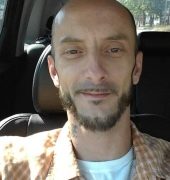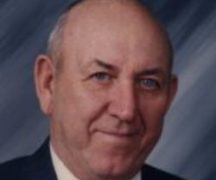William R. Rock, the only child of David R. and Mildred G. Rock, was born (at home) in Mercersburg, PA, on April 8, 1930. Entering first grade at age 5, he was educated in the public schools of Mercersburg, then Gettysburg College (B.A, 1951) and Duke University (M.A., 1953 and Ph.D. in modern European history, 1956). After Duke, he was drafted into the U.S. Army (Third Armored Division), and often noted humorously that he was perhaps the only buck private in the U.S. army with a Ph.D. Assigned, after basic training at Ft. Knox, KY, to the Division newspaper staff, he wrote feature articles about Europe generally and Germany, in particular (to which the division moved at length en masse), and authored a widely-distributed division history calculated to enhance esprit de corps.
Upon release from military service, he served a one-year appointment in the History Department at Duke, then came to BGSU in 1958, the 8th member of a department that gradually grew to 28 members by the mid-1970s. In addition to chairing the department from 1969 to 1973, and serving two separate stints as Graduate Coordinator, he was elected to a variety of departmental, college, and university committees, including Faculty Senate, Academic Council, Arts and Sciences Council, Graduate Council, University Budget Council, Faculty Personnel and Conciliation Committee, Faculty Research Committee, and a number of ad hoc committees literally too numerous to mention. He retired from full-time work in 1989 and taught for five “supplemental” semesters.
Typifying and promoting the kind of faculty that BGSU was striving to build, he demonstrated balanced interests in teaching and research. Early recognized for superior lecturing skills and recipient of the Samuel S. Casper Distinguished Faculty Award (1967), his teaching evaluations were always among the best in the department, and his record of research and publication was instrumental in promoting a new standard as BGSU continued the push toward excellence in scholarship. Along the way he authored four books on British foreign policy in the 1930s and the origins of World War II, and came to be recognized as “one of America’s leading scholars” in that area (quoting a distinguished professor at Manchester University, England). Professionally active in other ways, he wrote articles for professional journals, authored more than 50 book reviews, evaluated manuscripts for various presses, read or commented upon papers at many professional meetings, and evaluated personnel for promotion at other universities. In 1985 he received the Distinguished Service Award of the Ohio Academy of History. He spent extensive time and energy in the development and inauguration of a doctoral program in History at BGSU, shepherded it through various accrediting agencies, saw it thrive for a number of years, then
suffered the disappointment of its discontinuation sometime after his retirement. He emphasized and modeled for his colleagues the importance of classroom performance, took great interest in department-building, and often referred to a “high point” in the latter 1970s when he and half a dozen colleagues at BGSU appeared as presenters on the annual program of the American Historical Association–more than any other university in the country.
While at Duke University in 1952, Bill encountered the love of his life, Suzanne Beck of Columbus, Ohio, in the Lutheran Student Association. They married in June 1955, after degrees were completed. Not eligible for government housing, they lived in Elizabethtown, KY, while Bill was at Ft. Knox, then “on the economy” in Frankfurt, Germany–which Bill found useful relative to his qualifications as a European historian. Their eldest son, Stephen, was born in Germany; two other children, Anne and Brian, were born in Bowling Green. All survive, along with their respective spouses, Jenny, Richard Elliott, and Lori, and seven grandchildren; and all three children have abundant memories of a wide assortment of family activities (including camping) undertaken together as long as they were at home. Bill was a dedicated family man, often explaining that he determined early in adulthood, influenced by his mother, to concentrate on three particular areas of life: job, family, and church. This sometimes meant pushing aside a number of other interests; for example, he loved music, early became a good trombonist (playing in the Mercersburg and Waynesboro, Pa. Community bands), and cherished singing for four years in the Gettysburg College Choir. But he felt a keen need to excel, insofar as possible, in a few limited areas rather than spreading himself too thin. His three areas of emphasis profited accordingly.
Carefully nurtured in this regard by his parents, Bill grew up in the Lutheran Church and remained a committed believer, advocate, and supporter throughout his life. In Bowling Green, he served in important capacities relating to the construction of a new church building on South College Drive in the early 1960’s, and his leadership was instrumental in the $2 million expansion of those facilities at the turn of the century. He taught adult Sunday School intermittently, sang in the choir for 44 years, and served on the Church Council for twenty years (holding the presidency of Council for four terms). In retirement, two of his major activities were doing kitchen duty for Wednesday evening meals (for 100 or more people with economic or companionship needs) and serving for 17 years on the Ohio ELCA Candidacy Committee, screening and examining candidates for the Lutheran ministry. He was also a long-time deliverer of Wheeled Meals.
Bill’s faith was simple and direct; he had little patience for complex theological argumentation or intricate Biblical interpretation, and believed that one studies the Bible for two primary purposes: tolearn about the nature of God and how He expects us to live in relation to one another. His commitment to the church was reinforced by the view that it was there primarily that he encountered people who tried hardest to live by the values that he considered make life worth living.
A Celebration of Bill’s Life will be announced at a later date. Funeral arrangements have been entrusted to Dunn Funeral Home in Bowling Green. Memorial contributions may be given in his memory to Simpson Garden Park in Bowling Green.
To share an online condolence or fond memory with the Rock family please visit www.dunnfuneralhome.com.





